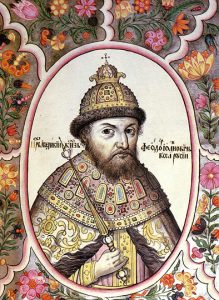(1584 – 1598)

After the death of Ivan IV the Terrible, his son Feodor Ivanovich, quiet in temper, weak and painful, ascended the throne. He was not able to manage the state, and therefore granted the management of the affairs of his brother’s brother, clever and cunning, Boris Godunov.
Thus, Feodor Ivanovich was king only by name.
The rapid rise of Godunov, not Russian in origin (the ancestor of Boris was the Tartar Murza Chet, who accepted the Christian faith and entered the service of the Moscow prince in the fourteenth century), was not liked by most of the boyars.
Particularly hostile to Godunov boyars Shuiskys, Mstislavsky, Vorotynsky were sent out to cities, imprisoned or tonsured.
Metropolitan Dionysius, who condemned Godunov’s deeds, was deposed, and in his place was betrayed to Boris Godunov by the Rostov Archbishop Job.
Godunov enjoyed great power and ruled the state without rivals, calling himself the son of a “near great boyar.” He laid the Arkhangelsk pier on the White Sea, where foreign merchant ships could come.
Under Godunov, there was a war with the Swedes, which ended in the return of the cities they lost: Yama, Koporye, Ivangorod.
In 1591, the Crimean Khan Kazyl-Girey wanted to attack Moscow, but when he met a large army under his walls, he retired.
In Siberia, the Russians approved their rule by the construction of fortresses (Tobolsk, Pelym, Berezov, etc.).
In 1589, at the request of Tsar Feodor Ivanovich, a patriarchate was established in Russia. The first to receive this highest order was Metropolitan Job.
An important government decree of Godunov is the attachment of peasants to the land, i.e. prohibition to the peasants to move from one place to another, as was done in times of destitution, when the peasants were free farmers. Large landowners lured the peasants from the small, who complained about the inability to conduct military service, because their lands are left without peasants. The Code of Law of John III, this right is limited, but it was allowed to go only once a year near St. George’s Day. According to the decree of Tsar Feodor Ivanovich, the peasants were to remain on the land on which they were seized.
In 1591, Tsarevich Dmitry was killed, the heir to the childless Feodor. The investigation into this case did not lead to anything. Feodor was informed that the prince, in a fit of epileptic illness, himself stabbed himself with a knife, but the popular rumor accused Godunov.
In 1598, Feodor died, and the Rurik dynasty ended.
Troubled time from 1598 to 1613.